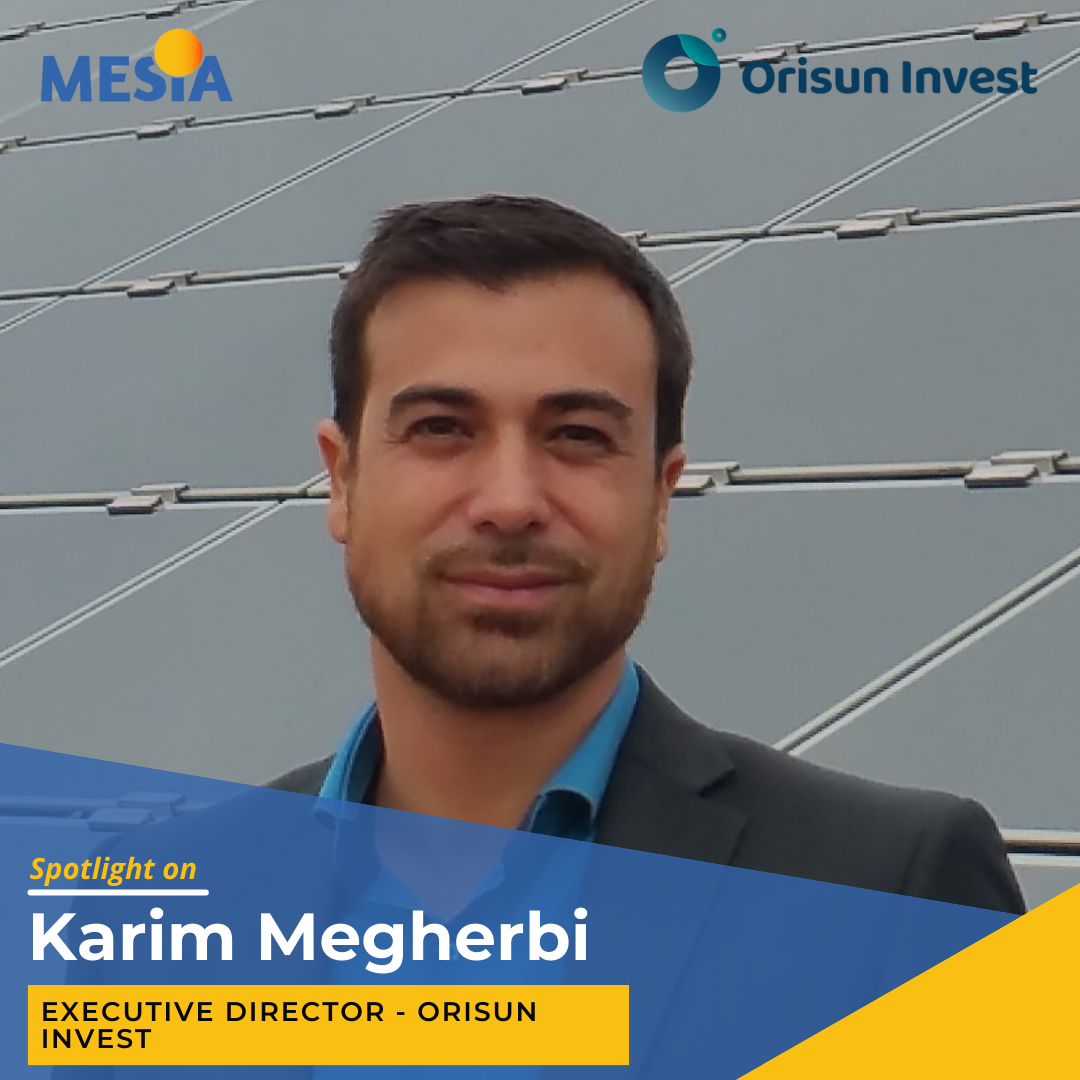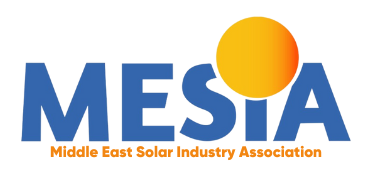Spotlight on Karim Megherbi, Executive Director at Orisun Invest

Karim is the Founder and Executive Director of Orisun Invest, a project origination platform in renewable energy which has closed 605 MW of solar and wind transactions in 9 countries since 2021, and with more than 1.8 GW under mandate with leading IPP and investors.
Karim has over 18 years of experience in the energy sector, providing advisory and development services to both private companies and governments. He participated in the closing of over $800 million of equity financing, while building a pipeline of more than 2 GW in 15 different emerging markets.
Earlier in his career, Karim held managerial positions at Dexia Bank, participating in the origination, structuring and closing of more than $ 1.5 billion of debt and over 1 GW of on-shore wind and solar capacities.
Karim advocates for the acceleration of the energy transition through his active roles with Dii Desert Energy, IRENA Coalition for Action and the Global Solar Council.
Please describe your role at Orisun Invest as well as your industry expertise.
Working in renewable energy since 2005, I witnessed the early implementation of Feed-In-Tariff in Europe. The industry later shifted to China, resulting in a significant drop in solar prices. The technology quickly became highly competitive, emerging as the most cost-effective means of electricity production in most markets today.
During this journey I worked as a banker in Project finance, as a financial advisor both for governments and companies, and as a developer in Sub-Saharan Africa, the Caribbean, Central Asia and Asia, either as an independent entrepreneur or as part of a team.
After my last experience with a development team based in Dubai working for a large European IPP, I founded Orisun Invest. I wanted to introduce a new service to the market which I believed was missing: a company focused on originating transactions for selected partners. Our role extends beyond sourcing deals or equity: we assist in the initial structuring of transactions, offer advice, and support both parties throughout negotiations to prevent deadlock situations and facilitate discussions.
So far the market has responded very positively to our business model.
What motivated Orisun Invest to establish an office in the MENA region?
At first I established Orisun in Dubai as this was where I have been living for 5 years. However after successfully closing few transactions, we revisited this choice, and conclude that staying in Dubai is for now the best choice for the following reasons:
- We cover both Asia, Africa and Europe. Dubai is ideally located and allows us to be close to our target markets
- We cover emerging markets, and Dubai’s diplomacy and business environment is very much oriented towards these markets
- It’s a cheaper than Singapore or Hong Kong, with excellent infrastructure
- We’re in the heart of the transformation of fossil fuel economies which have been relying on their exports for decades. At the same time the UAE is the headquarter of the IRENA. It’s an interesting place to feel the pulse of the energy transition, with all its contradictions.
We hope that Dubai accelerates its ambition to become a sustainable city, as emissions per capita are extremely high. While being in a desert has its obvious challenges, Dubai is also close to the sea and the UAEs’ population is less than 10 million. It’s a modern city which can showcase actions and technologies with high impacts on emissions, by lowering energy and material footprints, as well as through innovative organisations of transport and waste management for example.
Can you tell us about what sets you apart from other competitors?
We diverge from platforms displaying transactions openly online as we believe this model fosters unnecessary competition among investors and can be intrusive for developers.
Our approach involves extensive preliminary work to ensure a project aligns with our investors' criteria, demanding a high level of expertise and knowledge in regulatory frameworks, financial modeling, contractual structures, development processes, and risk assessment.
At first we collaborate with project owners and once we believe the transaction is suitable for our investors, only then we approach them, focusing on the most motivated ones who match best with the project owner's expectations.
This efficient process has resulted in a 90% conversion rate of NBO into transaction close.
We operate more like financial advisors but with an entrepreneur mindset emphasizing commercial support and we advise both parties. We also have strategic investors for specific markets, such as India, where we've closed recently 169MW and have a substantial pipeline. Occasionally, we partner with financial advisors when deemed optimal for the developer.
What's a recent milestone Orisun Invest has achieved that you would like to share with us?
Recently we closed the acquisition of 5 SPV of 20MWac solar each in Karnataka, India, by Technique Solaire (France) from Renew Power, the largest renewable platform in India.
We’re very proud of this transaction, not only because of the quality of the partners and the projects, but also because our business model was recognized as being very efficient by our partners:
- The transaction was not in the market and it was triggered through our discussions with the seller
- We had already a framework agreement with an investor, with very clear criteria and equity immediately available
- Orisun brought assistance to both parties and helped in numerous moments to avoid deadlock situations
- We were able to provide advice based on our internal financial analysis, technical expertise when yield was reviewed, and contractual experience
We’re now working on another transaction much bigger with the same parties.
What are your expectations for the MENA region in terms of growth and new opportunities for Orisun Invest?
The MENA region plays a dual role in the energy transition, by both leading and/or following the energy transition.
Business-wise, there's no imperative for the region to cut its oil and gas production due to their low extraction costs, positioning them as among the last standing in a declining demand.
While the region currently eyes Asia for oil trade opportunities, it recognizes the need for transformation in light of climate change challenges and decreasing demand from OECD countries.
The MENA region, blessed with excellent wind and solar resources, envisions a future without fossil fuels for electricity production. This is the region with the largest projects in the world, and the lowest LCOE, below 15USD/MWh. This price is below the variable costs – fuel including – of CCGT, which means that there is no longer any reason to burn fossil fuel to produce electricity. They also have champions such as Acwa Power and Masdar, investing billions in renewable energy all over the world, especially in emerging markets.
The region is investing in flexibility, smart grids, interconnections to mamage a increasing portion of variable generation in the mix. What’s more, with an existing oil&gas infrastructure, available land, access to the seas, the regions is positioning itslef as a future leader in green hydrogen.
Last but not least, some countries have understood that more needs to be dfone on the demand side – 70% of peak demand for example comes from AC. Escow models are being implemented in the UAE and hopefully will spread in the region.
We see a growing number of opportunities in hydrogen and solar C&I. Simultaneously, companies or investors are contacting us to secure projects for them in our active markets. As a UAE-based company, we are delighted to work more with investors from the region.
How do you see the effects of the increasing adoption of solar energy on the MENA's economy in the coming years?
By 2050, solar is poised to become the primary energy source in the region. Beyond dominating the electricity mix, it will extend into various sector couplings and be an integral part of all real estate initiatives. The trajectory of solar in the industrial landscape remains uncertain, and the region's integration with others, potentially through regional supergrids, is yet to unfold. Nevertheless, solar is steadily evolving into the new oil, whether as electrons, molecules, or products for export.
